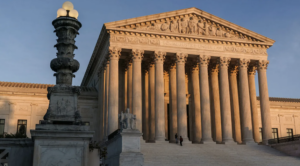Trump’s lawyers: ‘Without immunity from prosecution, we will not have a President’
In the Special Counsel case, the U.S. Supreme Court agreed to review whether former President Donald Trump could be prosecuted under federal election interference laws. The dispute will be a significant political and legal issue in the United States during the upcoming election.
The justices have fast-tracked the appeal and will hear oral arguments in late April, with a ruling on the merits expected by late June. Trump’s criminal trial has been put on hold pending resolution of the matter.
Arguments will begin to break out in the week of April 22.
This is the second time the High Court has heard the case involving the Republican candidate for president. Separate arguments were held earlier this month to determine whether Trump could be removed from the Colorado primary ballot due to claims that he had committed “insurrections” during the Capitol Riots of Jan. 6, 2021.
The High Court heard an urgent appeal from Trump, who claimed that his immunity as president protected him from prosecution in Special Counsel Jack Smith’s 2020 election interference case.
This request was made just days after an appeals court in Washington, D.C. ruled that the former president of the United States, who is also the GOP’s frontrunner for 2024, cannot be immune from prosecution.
The Trump legal staff requested a temporary relief to block the appeals court’s mandate.
Smith requested, a few months later, that the U.S. Supreme Court deny Trump’s demand to delay his case.
The special counsel’s filing did not refer to the November elections or Trump as the Republican frontrunner. The prosecutors said that the case had “unique importance for the nation” and that any delay would threaten the right of the public to receive a fair and quick verdict.
 Smith asks the U.S. Supreme Court to hear Trump’s claim that he is immune from criminal charges for election interference.
Smith asks the U.S. Supreme Court to hear Trump’s claim that he is immune from criminal charges for election interference.
Smith’s lawsuit has been suspended pending a resolution to the immunity issue.
In his request, Trump stated, “If prosecution of Presidents is upheld, such prosecutions would recur and be more frequent, ushering destructive cycles of recrimination.” “Criminal prosecution with its stigma and harsher punishments creates greater “personal vulnerabilities” for presidents than civil penalties.
The request also stated: “The threat to criminal prosecution in the future by an opposing government will overshadow official acts taken by any future Presidents – especially those most controversial purely on a political basis. ” ”
In the request, it is stated that “political enemies” of the president will try to influence or control their decisions through blackmail and extortion. The request also threatens them with indictment for actions that do not warrant prosecution by a hostile future administration.
Every future president will have to live with the threat. The threat of this will affect their decision-making and their ability to “deal with their duties fearlessly and fairly”.
 The Supreme Court Building, Washington, D.C.
The Supreme Court Building, Washington, D.C.
Trump’s attorneys added: Without immunity against criminal prosecution, the presidency as we know it will cease to exist.
This was decided after Washington, D.C. federal judge Tanya Chutkan delayed the trial, scheduled to begin Monday. It was made a day ahead of the Super Tuesday primary, where Alabama, Alaska, and American Samoa are voting for the GOP nominee.
Chutkan stated in December that the Supreme Court has jurisdiction over this matter. Chutkan suspended the case against the Republican candidate for the 2024 election, pending a determination by the Supreme Court as to its involvement.
Smith accused the former president of conspiracy to defraud, conspiracy to obstruct a proceeding, and obstruction and attempted obstruction. The charges were based on Smith’s investigation to determine whether Trump had been involved in the Capitol Riot that occurred on January 6, and if there was any interference with the results of the 2020 elections.
In August of this year, Trump pleaded guilty to all the charges that were brought against him.










